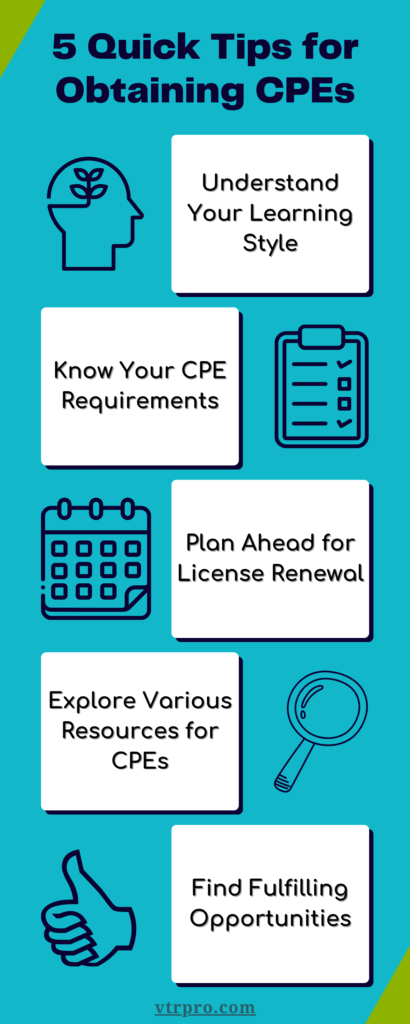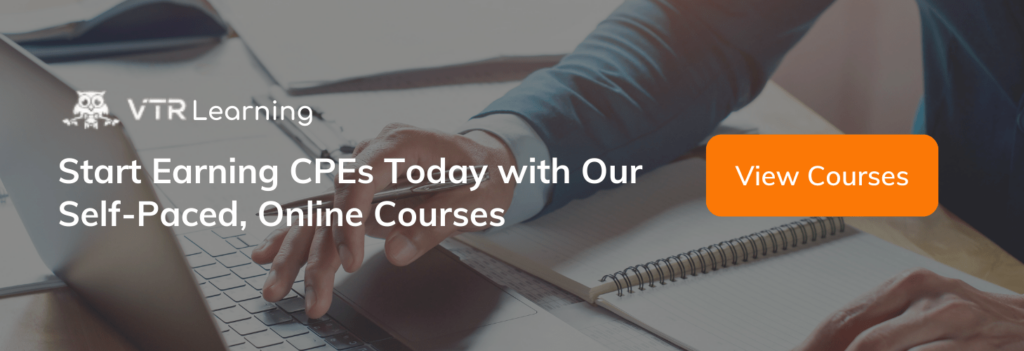![How to Earn CPEs [5 Quick Tips]](/wp-content/uploads/2022/06/5-Quick-Tips-for-Obtaining-CPEs.png)
Let’s face it – earning CPEs isn’t the most exciting venture one could hope to embark on. It costs time and money, and just as the renewal cycle ends, it seems to begin again. But continuing education is still a requirement for licensure with many professional organizations, including the AICPA. And because fresh knowledge is so important to many career paths, it isn’t going away soon. In fact, it shouldn’t disappear. Despite the tedium of learning, it undoubtedly contributes to a more well-rounded outlook and enhanced skills. So, while people might groan about the process, it serves an important purpose. Fortunately, there are several tips to help make the experience better.
Helpful Tips for Earning CPEs
1. Understand Your Learning Style
Perhaps the most important advice when it comes to earning CPEs – or education in general – is recognizing how you learn. Bay Atlantic University recognizes at least four primary learning styles, including:
- Visual
- Auditory
- Kinesthetic
- Reading/Writing
However, other sources describe seven or more styles, such as solitary, social, and logical. The point is, there are many different ways individuals learn. And two people may very well have different dominant learning styles. One person may need a concept mapped out on a whiteboard while another might simply close their eyes and listen. Of course, the differences don’t make any one style better or worse than another. Quite the opposite, in fact. Different teaching and learning styles make it possible for individuals of all types to gain a better education. And when it comes to earning CPEs, the same is true.
Knowing how you learn best is key to choosing the right CPE provider and delivery method. Because the AICPA allows for many types of learning activities, CPAs should be able to find one that works well. For example, online self-study courses have multiple benefits for those who are either visual or auditory learners. Alternatively, reading eBooks or writing educational material could appeal more to others.
Overall, the tip is simple – figure out how you learn best, so you know what kinds of opportunities to look for when earning CPEs.
2. Know Your Requirements
There are several organizations which require their members to collect CPEs. And within a single organization, some members have different requirements than others. So, it’s important not only to understand CPE but your overall requirements as well. For members of the AICPA, these rules actually vary by location. So, each state actually has its own set of recertification requirements that members need to stay aware of.
Understanding the boundaries and limitations of learning activities is essential when earning CPEs. Because if a person goes into the process unaware of these factors, they might end up wasting money and time. And unfortunately, this could lead to other license penalties and setbacks. So, it’s important at the outset to know what kinds of activities the state board will accept.
3. Plan Ahead
One of the most difficult aspects of the license renewal cycle is staying on track. Many individuals have great ambition to finish early and with time to spare. However, they often end up scrambling at the deadline, trying to squeeze in as many CPEs as possible. And much of the time, this happens because of a lack of planning and execution. That is, people either fail to have a plan at all, or if they do, they don’t follow through. Both are necessary to ensuring a smooth, successful process.
At the same time, having a plan for earning CPEs doesn’t necessarily mean a minute-by-minute itinerary. Because while a roadmap is a necessity, it also has to remain flexible. There are certain factors in life which can derail a carefully structured plan. And if there’s no room left for change, the results could be disastrous. However, if an individual recognizes the potential disruptions and accounts for them, their plan can remain relatively stable, even as it changes.
At the most basic level, individuals should research and understand the amount of time they will need to dedicate to continuing education. We even have a useful guide to the recertification process that can help you accomplish that. And second to that, it’s helpful to have some idea of overall cost. Moreover, scheduling conferences, events, and even self-study activities can further solidify the specifics. So, even though the overall process takes several years, they’ll have an idea of where they’re at and where to go.
4. Explore Various Resources for CPEs
Just as there are many learning styles, there are many methods and providers for CPEs. Some host online courses while others provide physical, written material. Even in-person university classes often count for credit. So, there are plenty of available resources to shape the learning experience to the needs of the individual. However, these resources aren’t limited to activity providers themselves. They also include different sites and publications dedicated to providing helpful information about earning CPEs. The OSCPA is one example for accountants in Oklahoma. It fulfills three distinct roles, all of which aim at helping CPAs:
- Provide membership benefits for CPAs to address specific needs
- Offer unique educational opportunities for professionals and the general public
- Sponsor and host events for professional networking between CPAs
Of course, the OSCPA is only one of hundreds of resources available to AICPA members. And in finding these sites and publications, individuals may very well discover new opportunities for earning CPEs. If nothing else, they’ll begin constructing a network of helpful resources they can turn to with questions, concerns and general curiosity.
5. Find Fulfilling Opportunities
Ultimately, learning should provide a sense of fulfillment. Beginning to understand a new or difficult topic is a rewarding pursuit in itself. But understandably, not all opportunities for earning CPEs offer the same level of satisfaction. Particularly if they’re stale, boring or uninspiring. When it comes to continuing education, individuals need to find fulfilling learning activities. Because loss of interest can actually inhibit the ability to retain important information and ideas. Of course, finding the right activities might require a bit of trial and error. But because the license renewal process happens every one-to-three years for CPAs, there’s plenty of time to discover them.
The Core of Earning CPEs
Perhaps the crux of this entire list of tips is summed up rather simply. Every CPA is a person with different needs, interests, and aspirations. The best path forward for one individual might not be the best for another, and that’s all right. Each person has a responsibility both to themselves and their career to discover what methods for earning CPEs works best for them.
Of course, VTR Learning would love to be part of that process. Because we have unique story-based courses, eBooks, and a host of other formats to help meet the needs of various learning styles. But at the same time, our core focus is on ensuring each individual receives what they need. So, if you aren’t able to find that through us, we’ll understand. But that doesn’t mean we wouldn’t like you to try.
CPAs can earn 2 free CPEs with our Financial Performance Analysis course. So, they have the option to check out our style of education with absolutely no financial risk.
Admittedly, the process of continuing education is a long one. It’s often an anxious journey, with worry over time and money. But by following these quick tips, you can begin to take some of the stress out of earning CPEs.

Last Updated:



![Idaho CPA CPE Requirements [Updated 2025]](/wp-content/uploads/2021/03/Idaho-CPA-CPE-Requirements.png)
![Guam CPA CPE Requirements for Recertification [Updated 2025]](/wp-content/uploads/2021/05/Guam-CPA-CPE-Requirements.png)
![New Jersey CPA Requirements [Updated 2025]](/wp-content/uploads/2020/11/NJ-CPA-CPE-Requirements.png)